#The Sun And The Void
Explore tagged Tumblr posts
Text
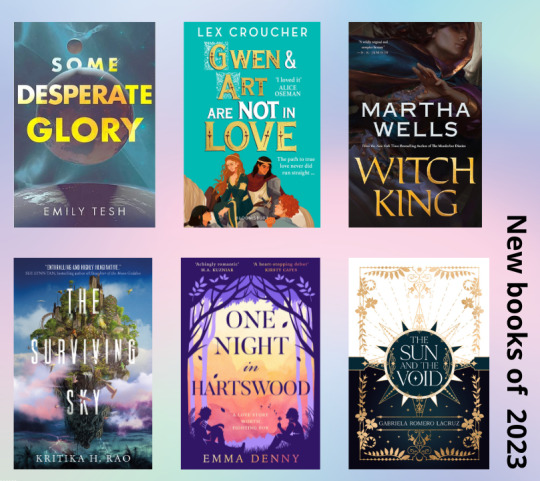
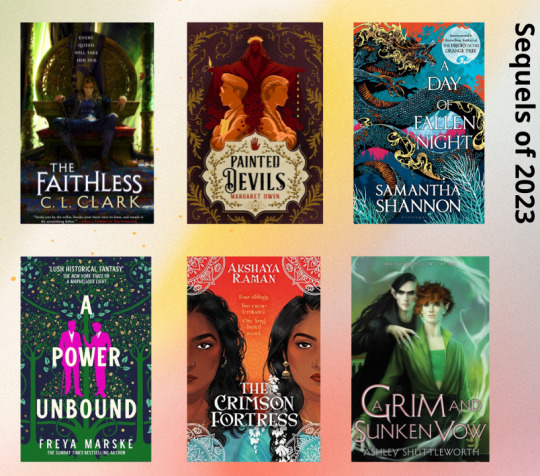
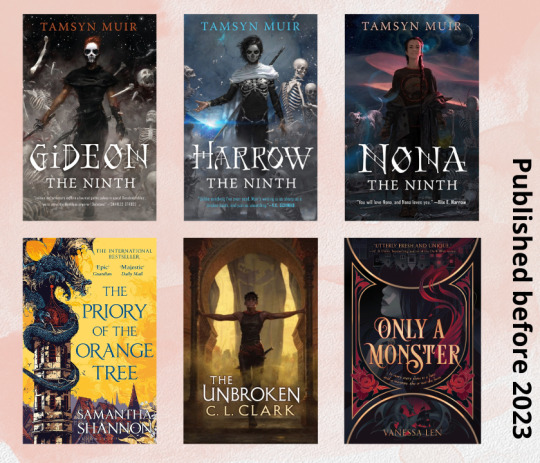
Here are some of my favorite books I read this year, divided into three categories because I'm not good at choosing.
#some desperate glory#emily tesh#gwen and art are not in love#lex croucher#witch king#martha wells#the surviving sky#kritika h rao#one night in hartswood#emma denny#the sun and the void#gabriela romero lacruz#the unbroken#the faithless#c.l. clark#painted devils#margaret owen#a day of fallen night#the priory of the orange tree#samantha shannon#a power unbound#the last binding#Freya marske#the crimson fortress#akshaya raman#a grim and sunken vow#hollow star saga#ashley shuttleworth#gideon the ninth#harrow the ninth
348 notes
·
View notes
Text
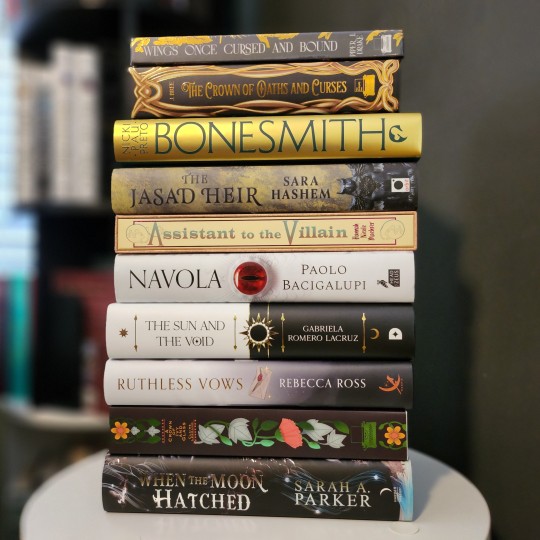
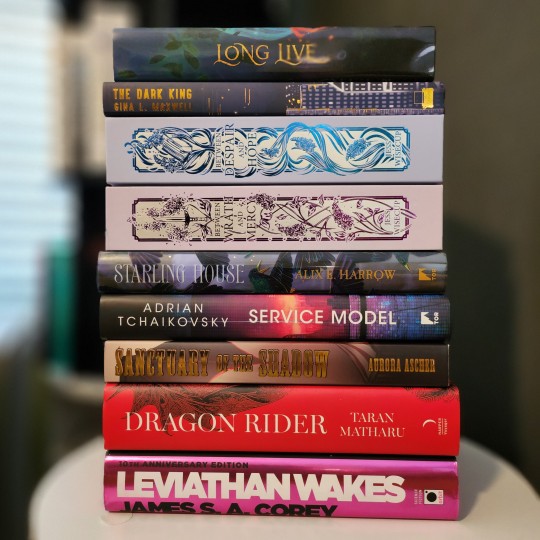
Fall Special Edition Reading Challenge
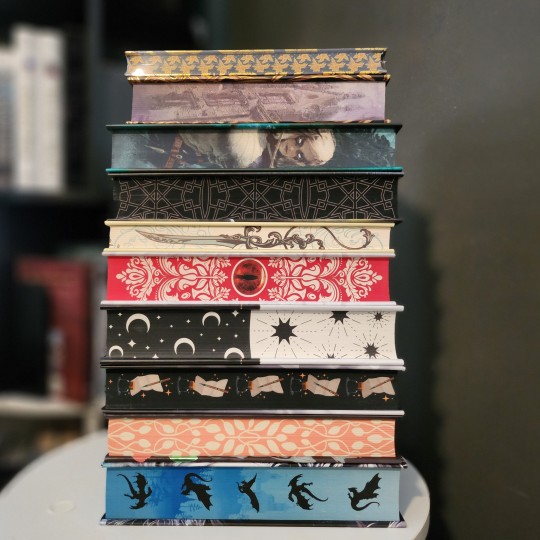
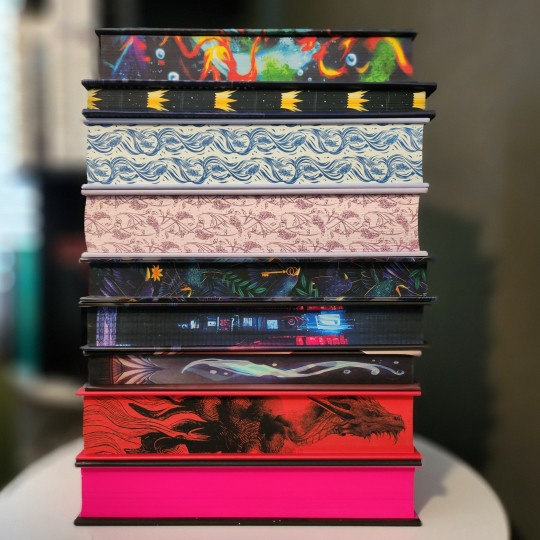
Whoops! I've got a big TBR problem and a chunk of that is thanks to my love for special editions. The issue? I haven't read more than half of the SE's I own, and I can't keep allowing myself to purchase more when I don't even know if I like what I have. Plus I'm beyond out of space on my shelves and I think it's about time I start unhauling what I don't like instead of excusing their existence "because they're pretty."
So for this fall/autumn season, from September through November, I'm challenging myself to finish all 19 of my currently unread SE's and decide if they stay or if they go. Technically more books I preordered have arrived since taking these photos, and there are more to be delivered this fall, but I will not be forcing myself to include them.
Have you read any of these? If so, did you enjoy them? Are there some in here you want to read, but haven't had the chance yet?
Feel free to comment or tag the SE you like best just based on looks!
#reading#books#reading challenge#booklr#special edition#Wings Once Cursed And Bound#The Crown Of Oaths And Curses#Bonesmith#The Jasad Heir#Assistant To The Villain#Navola#The Sun And The Void#Ruthless Vows#A Crown Of Ivy And Glass#When The Moon Hatched#Piper J. Drake#J. Bree#Nicki Pau Preto#Sara Hashem#Hannah Nicole Maehrer#Paolo Bacigalupi#Gabriela Romero Lacruz#Rebecca Ross#Claire Legrand#Sarah A. Parker
11 notes
·
View notes
Text
Reina is desperate. Stuck on the edges of society, Reina's only hope lies in an invitation from a grandmother she's never met. But the journey to her is dangerous, and prayer can't always avert disaster. Attacked by creatures that stalk the mountains, Reina is on the verge of death until her grandmother, a dark sorceress, intervenes. Now dependent on the Dona's magic for her life, Reina will do anything to earn-and keep-her favor. Even the bidding of an ancient god who whispers to her at night. Eva Kesare is unwanted. Illegitimate and of mixed heritage, Eva is her family's shame. She tries to be the perfect daughter, but Eva is hiding a secret: magic calls to her. Eva knows she should fight the temptation. Magic is the sign of the dark god, and using it is punishable by death. Yet it's hard to ignore power when it has always been denied you. Eva is walking a dangerous path, one that gets stranger every day. And in the end, she'll become something she never imagined.
"Sometimes the garden path lined by rosebushes could lead to a thicket of thorns."
Gabriela Romero Lacruz's The Sun and the Void is the first book in a fantasy duology inspired by Venezuelan folklore, exploring themes of racism and twisted family dynamics well. The two PoV characters go each on a journey from passivity to taking agency and making choices. They’re not perfect characters, in fact they might infuriate some readers, but the author treats them seriously.
With her plot about being complicit in a sacrificial ritual, Reina is an unlikable protagonist who nevertheless is done very well, and following her journey of realization is very satisfying. Bound to the family that saved her, she latches onto the kinder members, willing to do everything that's asked of her, but the choices she makes at some turns are her saving grace. Eva is similarly trapped by her own blood relatives who despise the manner of her birth, and finally takes matters into her hands to carve her own path and save herself. As their paths cross, they're both changed by the experience, and their choices will prove to be explosive.
The supporting cast holds up well. Reina's grandmother shines with all her complexities, making her a well-rounded antagonist, and so does Celeste, a complicated character with a holier-than-thou attitude. The biggest surprises are Maior, graduating from background character to something more, and Javier, violent character with surprising depths. The interpersonal relationships between all these characters range from well-explored to barely scraping the surface, making some of the final beats inexplicable. Reina's relationship to Maior in particular suffers from this.
The worldbuilding is complex and intriguing, with an interesting magical system and races that are seen as other and dangerous. Our two main characters suffer from systemic racism, in a world where religious colonialism changed the attitude of the conquered land. There's political upheaval and a fight for their rights, but it's rather in the background, except in a big moment that should feel momentous but leads to absolutely nothing. Queerness isn't well-accepted either, and one could argue the need for recognition and the resentment towards who can pass are important themes of the book. Reina's infatuation with Celeste suffers from the ostracism in this world, and possibly we'll see in the next book the consequences of her beginning a relationship with a woman.
The pacing is the main problem of the novel, especially between the first and the second part of the book; the prose is at times evocative and at others a bit nonsensical.
The Sun and the Void is a promising debut with an interesting premise.
✨ 3.5 stars
[You can find more of my reviews about queer speculative fiction on my blog MISTY WORLD]
#gabriela romero lacruz#the sun and the void#lgbtq books#queer lit#queer books#queer sff#queer speculative fiction#books#book reviews#reading#gealach reads#gealach writes
5 notes
·
View notes
Text

Now reading 📖
#book lover#book worm#fantasy#fantasy romance#book corner#book community#reading community#now reading#Now reading#current read#the sun and the void#gabriela romero lacruz
6 notes
·
View notes
Text

4 notes
·
View notes
Text
Fave Five: Queer Adult Fiction Set in South America
Cantoras by Carolina de Robertis (Uruguay) Brickmakers by Selva Almada (Argentina) The Words That Remain by Stênio Gardel (Brazil) Thirst by Marina Yuszczuk (Argentina) Undiscovered by Gabriela Wiener (Peru) Bonus: While a fantasy novel, The Sun and the Void by Gabriela Romero Lacruz is set in a Venezuelan- and Colombian-inspired world.

View On WordPress
26 notes
·
View notes
Text

THE SUN AND THE VOID - GABRIELA ROMERO CRUZ Rating: ⭐️⭐️⭐️⭐️ The Sun and the Void is told from the dual points of view of Reina and Eva, both young women that are trying to fit into societies that reject them. Gabriela Romero Lacruz uses a South American setting and mythology to create a world unlike any I’ve read before.
As this is the first book in a series it does have some worldbuilding that slows the start of the book down. However, once that initial build-up is done, it is realized to its full potential and becomes an exciting, fast-paced book.
You cannot help but root for both Reina and Eva, and I am excited to pick up the next one and find out what happens.
Many thanks to Orbit Books for an eARC via Netgalley in exchange for my honest review.
#books#the sun and the void#gabriela romero cruz#book review#sapphic lit#booklr#wlwbooks#wlwlit#wlw literature
22 notes
·
View notes
Text
The Sun and the Void - Gabriela Romero Lacruz (Warring Gods #1)
3.75/5 - Lesbians, Venezuelan/Colombian inspired imagery, very well-rounded characters, pacing is a little off
The Sun and the Void was, by and large, a very good debut novel from Romero Lacruz. The character and interpersonal relationships on page are rich and very clearly developed. The novel takes place in two post-colonial nations, and Romero Lacruz does not shy away from criticizing real world problems through the novel. Everything from forced conversion to Christianity to homophobia and sexism to discrimination and subjugation of native people. Specifically, Pentimiento, the religion most humans follow, is clearly based on Christianity.
The characters themselves feel like very full people and none of them are exclusively good or bad. They all have their moments of poor decision-making and cowardice that are balanced out by their moments of heroism and sacrifice. From a personal standpoint, I found it really difficult to get into the headspace of Eva Kesare, mostly because she annoyed me, but I found Reina fascinating. Her motivations and the danger she has to invite upon herself makes her character and her choices so much more fraught and really pulled me in, especially when looking at her relationship with her grandmother Ursulina.
However, the book itself struggles with some pacing issues. I was around 40% of the way through the book before I felt that we had really found the plot and get underway. The book could've been probably 10-15% shorter than it was if an editor had gone over it. Furthermore, many of Romero Lacruz's plot choices were predictable. This might be because I've read so much fantasy, but by around the halfway point of the book, I predicted the ending. This is not necessarily a bad thing, as it means Romero Lacruz's foreshadowing was well incorporated, but I think I would've liked a little more subtlety.
#the sun and the void#gabriela romero lacruz#reina duvianos#eva kesare serrano#book review#sapphic#fantasy#high fantasy
8 notes
·
View notes
Text
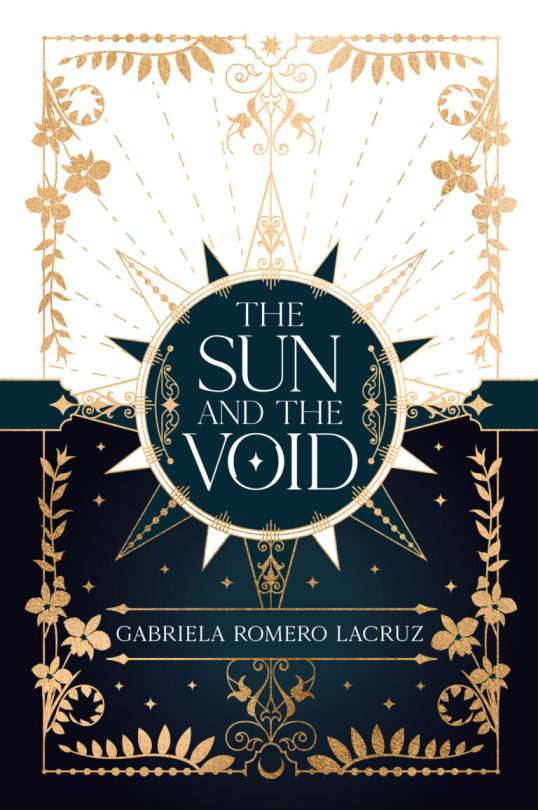
Title: The Sun and the Void | Author: Gabriela Romero-Lacruz | Publisher: Daphne Press (2023)
4 notes
·
View notes
Text

Prettiest Cover on my tbr ~
#illumicrate#the sun and the void#gabriela romero lacruz#fantasy#uk cover#book cover#special edition#sprayed edges#stenciled edges#flat lay#books#bookblr#booklr#book lover#bookish#bookstagram
113 notes
·
View notes
Text
Dona Laurel-Just How "Benevolent" Is She?
One of the few people to give Reina unconditional kindness is Dona Laurel Aguila, the caudila of Sadul Fuerte. Known as the "Benevolent Lady" by her servants, Dona Laurel cares for Reina as she recovers from her iridio transplant and offers her a home. She certainly isn't a cruel woman, but why has she widely been given this title?
For example, her servants call her The Benevolent Lady, but we see nothing to suggest that she actively helps the people of Sadul Fuerte. Reina has been a servant all her life, yet never notes that Dona Laurel is kinder towards her servants than other employers. In fact, Reina is only given special treatment because she's the daughter of Dona Laurel's deceased friend, Juan Vicente.
It's also strange that Dona Laurel never questions why Reina is a servant in the first place. Reina is meant to take Juan Vicente's place as an Aguila soldier, which would require courses in sword fighting and geomancia. However, Reina splits her time between serving the Aguilas and learning sword fighting. She doesn't balance these tasks effectively; in fact, the kitchen staff refuse to feed her because she can't complete her duties. The reader knows that Ursalina told Reina to spy on the Aguilas while serving them. Laurel, however, doesn't have this information. Why doesn't she exempt Reina from kitchen duties and have her focus on sword training? We never see her bring up this issue to Dona Ursalina.
Not expanding on how Dona Laurel earned this title is a missed world-building opportunity. Seeing her engage with the people of Sadul Fuerte could have informed the reader about the common man's struggles. For example, how do normal people fend off a monster they can't see? Do normal people learn to use geomancia, or is that only allowed for nobles and nuns? How do Penitents like Dona Laurel justify mining iridio, a powerful geomancia metal, when geomancia is contrary to their faith? Do any of the people under her rule bristle at this dissonance? The title makes this sound like a hit piece, but I really feel like Dona Laurel could've been more thatn a maternal figure for Reina. Seeing how she engages with the world could have fleshed it out more thoroughly.
2 notes
·
View notes
Text
➸ reading list
just added:
prophet, helen macdonald + sin blanché
our share of night, mariana enriquez
the sun and the void, gabriela romero-lacruz
a greek love: a novel of cuba, zoé valdés
the thursday murder club, richard osman
black england: a forgotten georgian history, gretchen gerzina
black people in the british empire, peter fryer
the end of men, christina sweeney-baird
the actor, chris macdonald
the black queen, jumata emill
#prophet#helen macdonald#sin blanche#our share of night#mariana enriquez#the sun and the void#gabriela romero lacruz#a greek love#zoe valdez#the thursday murder club#richard osman#black england#gretchen gerzina#black people in the british empire#peter fryer#the end of men#christina sweeney baird#the actor#chris macdonald#the black queen#jumata emill#reading list#tbr#booklr#bookblr#bookworm
6 notes
·
View notes
Text
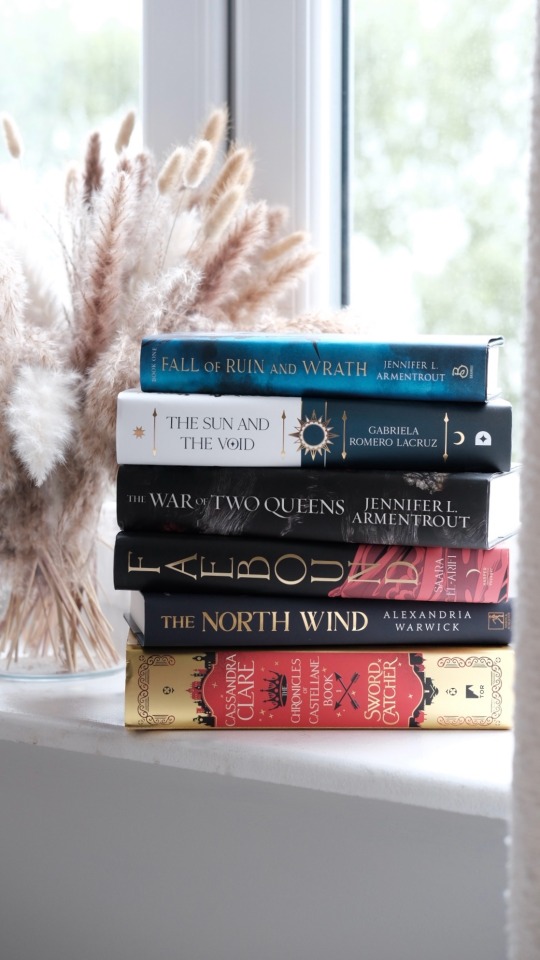
My to read pile 🤣
#to read#beautiful books#fantasy books#fantasy#book worm#book lover#book addict#love to read#the war of two queens#the north wind#fall of ruin and wrath#the sun and the void#sword catcher#faebound#pampas grass
6 notes
·
View notes
Text
The Sun and the Void, by Gabriela Romero Lacruz
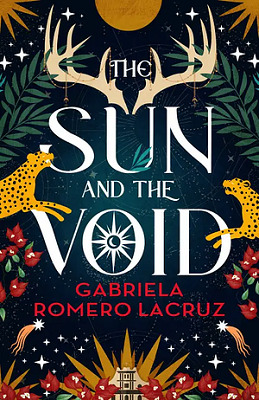
⭐⭐⭐⭐
Ches, the god of the sun, and Rahmagut, the god of the void, have been absent from the world ever since Ches defeated Rahmagut and sealed him away. But every so many years the celestial phenomenon known as Rahmagut's Claw crosses the night sky, heralding the opportunity to seek the god's favor to satisfy one wish. Such a time is upon the land. Reina, born powerless, seeks strength through her grandmother, a powerful sorceress, but instead winds up indebted to her. At the same time, Eva wants nothing more than to rise to her full potential, but with her family suppressing her true nature she decides to take her life into her own hands. As the stories of these two young women converge upon Rahmagut's tomb, dueling ambitions will determine whether the world continues on in relative peace or if the land will be thrust into chaos.
The world building in this novel is fantastic. It's a fantasy world based on Venezuelan history and folklore, with a magic system centered around using real-world metals as reagents. There were indigenous people who lived in the land before human colonizers arrived, as well as a revolution that brings to mind the rebuffing of certain real-world colonial empires. This is the first book of a series, and honestly it's mostly set-up. But the set-up is so interesting that I didn't even care. I can't say enough how much I love the magic system. It's exactly the right balance of simple and complex.
The dual-PoV was done very well. I found the two voices to be distinct, and the characters were believable. Sometimes they did foolish things — very foolish things — but those mistakes seemed natural. The supporting characters were also excellent(Maior was my favorite, by the end). I'm not sure what I think about Javier. I feel like I know where the author is taking his arc, and I think it's going to annoy me. I'd say he's honestly the biggest weakness of the entire book for me, because he leans on tropes — the sick boy, the jerk, the master manipulator — that I'm not a huge fan of, and yet he's so central. Fortunately he's not the only relationship present, so that softens the annoyance a bit, and the fact that Maior exists almost cancels his unpleasantness out.
The author is also an illustrator and has drawn her five primary characters. They appear in the book, some at the start of part 1 and some at part 2, and can also be viewed on her website. If you're a visual reader like me, I recommend checking all five portraits before you start reading so your brain performance of the book doesn't do any odd recasting. There is sapphic rep here, though in this first book at least it's predominantly incessant longing with some small payoff near the very end. The author claims that the next book will be spicier, so I imagine it will get more development later.
The book has frequent action sequences, mixing physical combat with spellcasting. This is going to be a weird comparison, because the settings and plots are nothing alike — not to mention I trust this author more than I trust Cassandra Clare — but whenever the characters were fighting I kept getting Shadowhunters vibes. In a good way. Don't @ me, I said it was weird.
#books#book review#the sun and the void#gabriela romero lacruz#the warring gods#fantasy#high fantasy#sapphic#queer#lgbtq
4 notes
·
View notes
Text
Diversity win your evil murderous racist grandmother is was also a lesbian
#hi i read a new book and i really liked it#the sun and the void#the sun and the void spoilers#tsatv#yeah I'm making up hashtags it's that new and i liked it that much#reina duvianos#ursulina duvianos
12 notes
·
View notes
Text
The Sun and the Void review
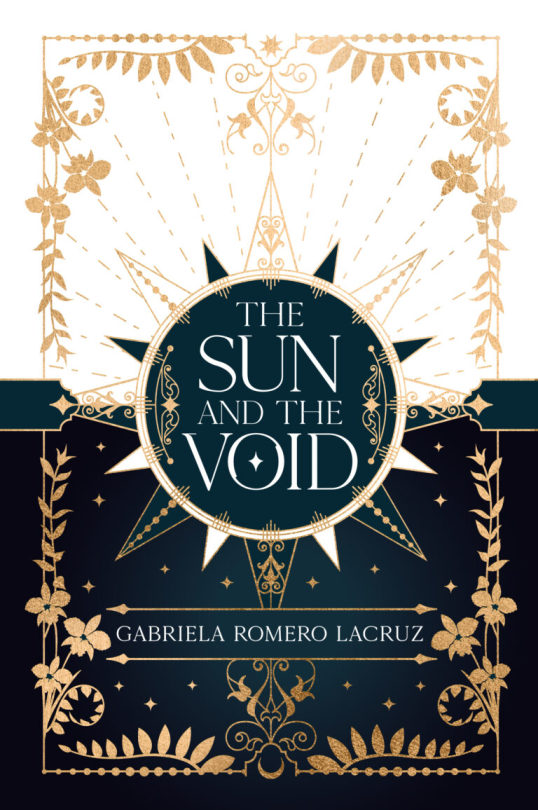
4/5 stars Recommended if you like: fantasy, South American fantasy, magic, multiple POVs The premise of this book is really intriguing. A Venezuelan- and Colombian-inspired fantasy with human and non-human races, the rock magic, sword fighting, etc. We're introduced to the idea of rock magic and to the non-human races, nozariels and valcos, fairly early on in the book. The nozariels have scales, a tail, and slit pupils, while the valcos have antlers and reddish irises. Both are stronger and faster than humans and have a natural affinity for magic...but that's pretty much all we learn about them. I wanted to know more about them and their culture, pre-contact and how it's evolved post-contact and post-revolution. Similarly, the magic was interesting to me and I liked the scenes that incorporated it. However, I never feel like I got a good grasp on what each of the different branches of magic were and how they were used. For a book with such an interesting premise, I wanted to see more of those things. While I think both Reina and Eva are supposed to feel like outsiders so they'll have motivations for their actions, I would've liked a moment where one or both of them was able to connect with someone else and have the nozariel/valco heritage explained (or shown) a bit more. As much as I like epic fantasies, I think this book could've done with being shorter. It's over 500 pages, but I really think that could've been reduced by 100-200 pages. Not much happens in the beginning aside from getting to know Eva and Reina and understanding the world the book is set in. The book starts picking up ~100-150 pages in and does keep a pretty fast pace for the rest of it, so I think just trimming the beginning down a bit would've helped prevent the book from feeling like it dragged. I'm also not sure this needed to be two POVs. Reina is clearly the main character of this book and most of the narration and action goes to her. Eva just kind of sits around with her family being miserable for a good portion of the book, then is dragged along by Javier, and then finally toward the end begins showing strong agency. Reina, on the other hand, is immediately shown to be someone willing to take things into her own hands, and her willingness to act continues throughout the book, even when the acts aren't always good and even when those acts are manipulated by others. This, combined with the fact that most of the chapters are from Reina's POV anyway, makes me thing that Eva's could've probably been cut down or out entirely and we could've had that information filled in in a different way. To be fair, Eva does begin to get more interesting ~50-60% of the way in, but that's quite late for someone who's supposed to be one of two main characters. For the characters themselves, Reina is half-nozariel raised by her father after her mother died. At the beginning of the book it's clear that Reina's father has also died at this point and she's journeying to try and meet up with her human grandmother, who has inexplicably reached out after almost 20 years of silence. From the get-go it's clear that Reina is caring and more than a little desperate to find her place in the world. She pretty much immediately falls in love (romantically and familially, respectively) with Celeste and Laurel, and the instantly high levels of devotion to them were a bit weird to me. Nevertheless, Reina's desire to have a family and a place in the world, and to make up for her 'monstrous heart' (do you feel monstrous? No? Okay then) means she doesn't always make the best decisions and is prone to being convinced of things by her grandmother, who very clearly has ulterior motives for everything she does (as much as I very much dislike Reina's grandmother, she really is an excellent character). Eva is in a similar boat, being half-valco and raised by her human family with no contact from the valco side. However, unlike Reina, whose father loved her dearly, Eva's family mostly shuns her and tells her that she should try very very hard to not be a demon spawn. Despite this, Eva does have some backbone and goes to see the local half-valco witch to learn some magic. She's pretty certain that her family's claims are wrong and she's not the devil's spawn, but when things start going a little sideways at home, with signs pointing to Eva, she begins to internalize what her family has been telling her and her backbone shrinks to nothing. It comes back a little bit and Eva is successfully able to start her journey toward power and independence, but once again she comes under the thumb of another...but to be fair, it ends up strengthening her seemingly out of sheer spite. As obnoxious as Javier is, Eva actually turns out better for the most part after meeting him. She still doesn't totally think through her decisions, but at least she's taking the reins and she is still good-hearted and wants to help people. One thing that bothered me about the book is how the human-nozariel-valco relationship is described. The humans came in, made contact with these non-human races (including a third that they hunted to extinction but which I suspect will come up in a later book), and then enslaved only the nozariels. This is despite the fact that they're faster and stronger and more magically inclined than humans. And why only the nozariels? Well, the valcos were a more war-oriented race and thus the humans largely left them alone. *Cue eyeroll* That whole description just feels very off to me and feels very hand-wavey-"well you should've fought harder if you didn't want to be a slave." Overall the premise of this book was pretty interesting but the book itself kind of took a while to get started and then once it did it didn't really focus on some of the more interesting aspects of the premise. I liked Reina as a character, even when she was making bad decisions, so I'm glad she gets the most page time.
#book#books#booklr#bookblr#bookish#bookaholic#book addict#books & libraries#books and reading#bookstagram#book review#the sun and the void#sapphic fantasy#sapphic characters#lgbtq characters#gabriela romero lacruz#fantasy south america#fantasy#fantasy book#adult fantasy
4 notes
·
View notes